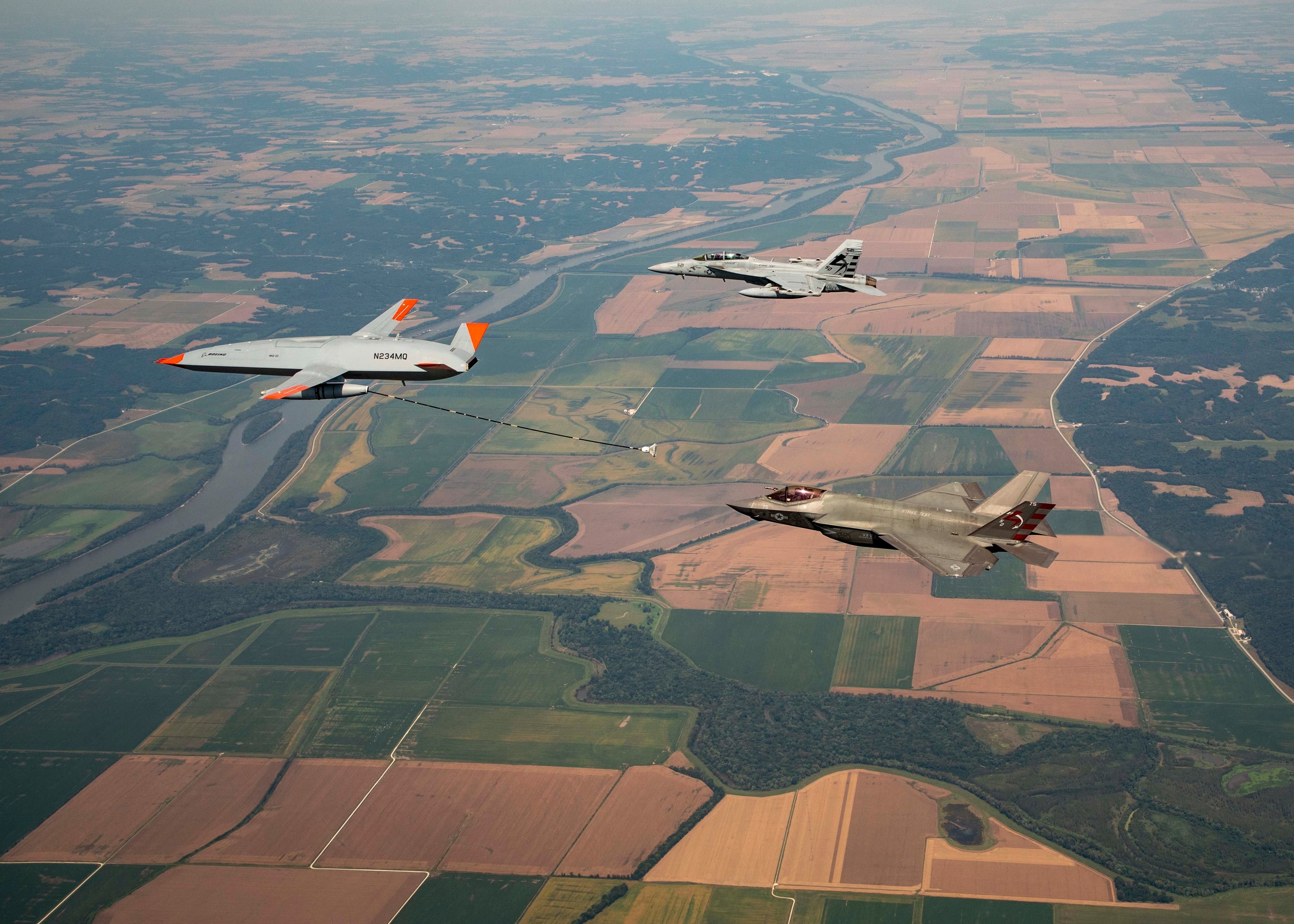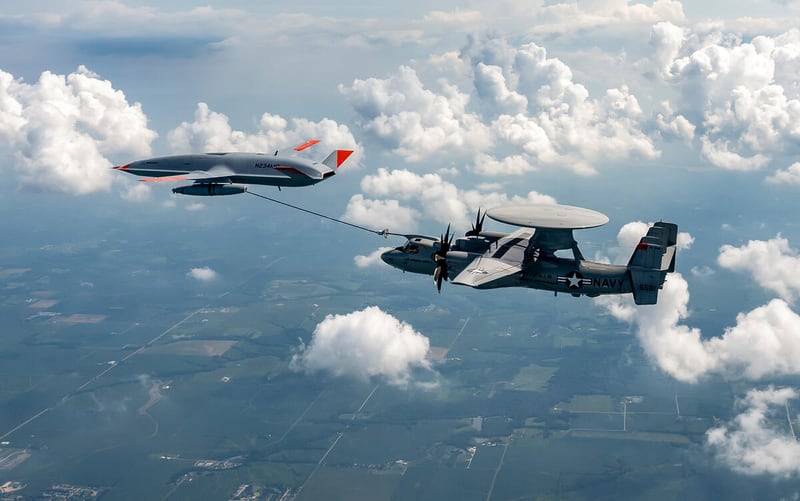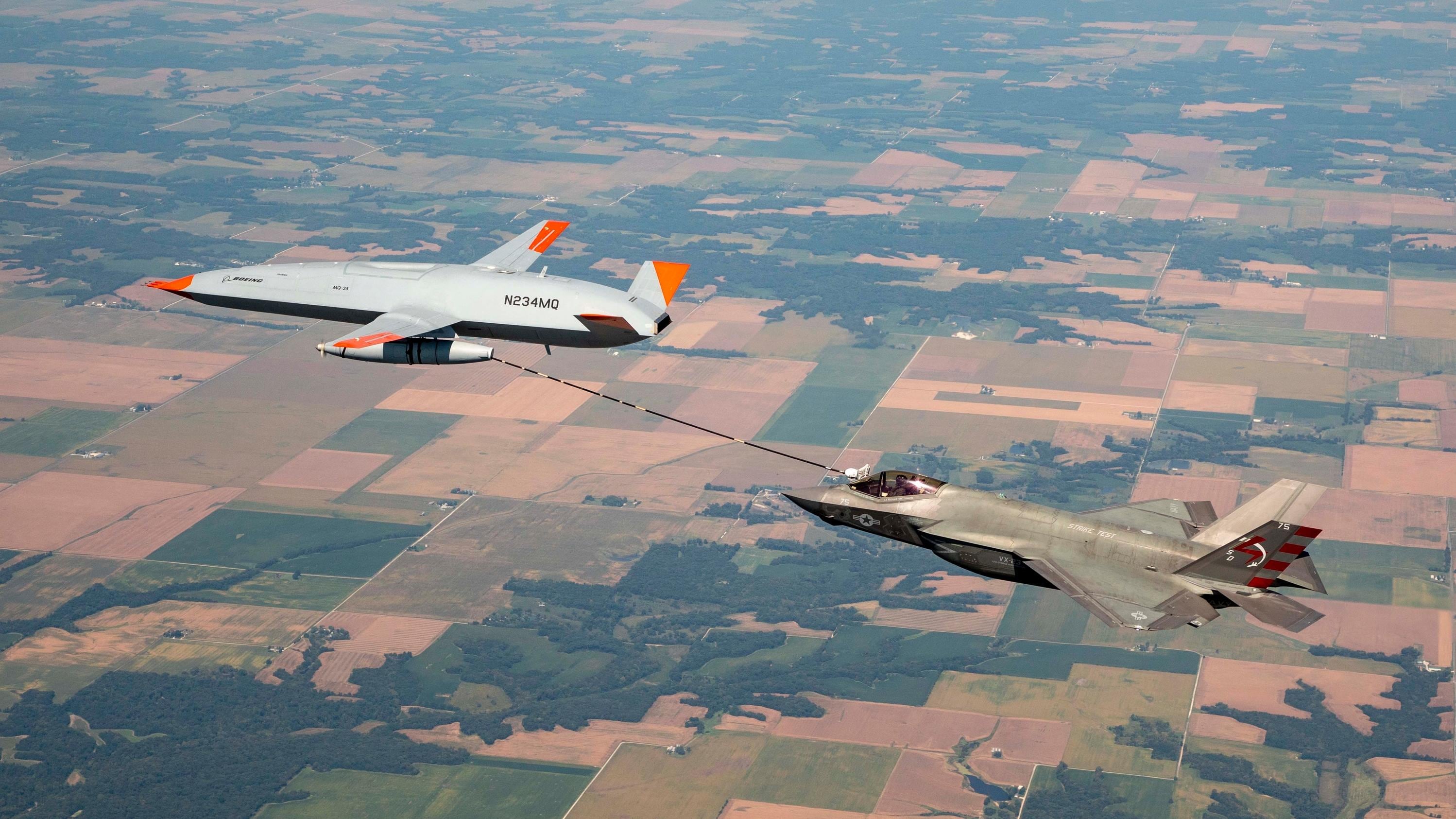WASHINGTON — The U.S. Navy’s MQ-25 Stingray unmanned tanker conducted its first aerial refueling with an F-35C Joint Strike Fighter, the third aircraft type to take fuel from the Navy’s first unmanned system designed to deploy in a future carrier strike group.
Boeing’s T1 test aircraft and an F-35C from the Navy’s Air Test Wing and Evaluation Squadron 23 conducted a three-hour mission on Sept. 13, taking off from the MidAmerica St. Louis Airport in Mascoutah, Ill., and then going through a methodical process of linking up and refueling in this test environment. The Navy pilot conducted surveys and evaluations of the unmanned aircraft and the air around it before connecting with its drogue at 225 knots and 10,000 feet altitude. An air vehicle operator at the ground control station then initiated the fuel transfer from T1′s aerial refueling store to the F-35C.
“Every T1 flight with another Type/Model/Series aircraft gets us one step closer to rapidly delivering a fully mission-capable MQ-25 to the fleet,” Navy program manager Capt. Chad Reed said in a news release. “Stingray’s unmatched refueling capability is going to increase the Navy’s power projection and provide operational flexibility to the carrier strike group commanders.”
The latest refueling follows a six-hour test flight on Aug. 18, when the MQ-25 refueled an E-2D Advanced Hawkeye for the first time. The E-2D was not originally built to receive fuel in-air but was modified to add the aerial refueling capability in 2019.
“Once operational, the MQ-25 will refuel every receiver-capable platform including E-2,” Reed said in a separate news release on the August flight test between T1 and the Navy’s Air Test and Evaluation Squadron Two Zero (VX) 20. “This flight keeps us on a fast track to getting the Stingray out to the fleet where its refueling capability will greatly increase the range and operational flexibility of the carrier air wing and strike group.”

The first aerial refueling test was conducted on June 4, when an F/A-18E-F Super Hornet refueled in air with the unmanned tanker for the first time in naval aviation history. In this first in-air encounter with the drone, a Super Hornet approached to take measurements, made several “dry connects” to practice connecting and detaching from the tanker, and made two actual refuelings, with 300 pounds and then 25 pounds of fuel being passed from the Stingray to the Super Hornet at different altitudes and flying conditions.
Last month, the Navy and Boeing conducted in a virtual environment the first manned-unmanned teaming event between the Stingray and a Super Hornet, where the manned jet bypassed the ground control station and communicated directly with the tanker drone to give directions on where and when to rendezvous for a refueling.
Chief of Naval Operations Adm. Mike Gilday said last week at the Defense News Conference these tests are “really our first foray into the carrier air wing of the future, understanding how we integrate it and how we leverage it, how we’re going to use unmanned and manned together in a way that’s going to be quite effective. "
“We’re learning a lot as we use the MQ-25 off the carrier decks in terms of employing unmanned air into a wing. That’s given us greater insights with respect to the direction we have to move with the air wing of the future,” he added.
In addition to these aerial refueling tests, the MQ-25 has been doing deck handling work and other testing behind the scenes to prepare for fleet introduction. T1 has done 36 flight tests, “providing the program with valuable information on aerodynamics, propulsion, guidance and control in advance of the MQ-25 engineering and manufacturing development aircraft deliveries,” according to the Sept. 14 news release.

With this third aerial refueling test complete, T1 will enter a modification period to integrate a deck handling system in preparation for a shipboard demonstration this winter, according to the news release.
Because each aircraft type is aerodynamically different and interacts with the MQ-25′s wake differently, these live flights, which feature extensive instrumentation to measure conditions during the refueling, help ensure Boeing and the Navy understand all the interactions between the manned and unmanned aircraft and can make any needed software adjustments.
The Navy announced last month it would begin standing up a fleet replacement squadron, Unmanned Carrier-Launched Multi Role Squadron (VUQ) 10, later this year, followed by two MQ-25A squadrons, VUQ-11 and 12, that will deploy detachments to the Navy’s aircraft carriers.
Megan Eckstein is the naval warfare reporter at Defense News. She has covered military news since 2009, with a focus on U.S. Navy and Marine Corps operations, acquisition programs and budgets. She has reported from four geographic fleets and is happiest when she’s filing stories from a ship. Megan is a University of Maryland alumna.




